written by Md. Muniful Islam Inan
Chapter 1: The First Door
The rain clawed at the windows like a living thing.
Aminul Chowdhury hunched over his desk, the last lit island in a newsroom gone dark hours ago.
The clock on the wall coughed out a metallic tick… tick… tick… each second drilling into the silence.
He should’ve gone home.
There were no deadlines tonight. No one left to impress. The paper was bleeding subscribers, bleeding money, bleeding hope.
But something gnawed at his gut, the way it always did before a real story found him.
Or swallowed him.
He was about to shut down his laptop when he noticed it.
An envelope.
Thick. Plain. White as bone. Sitting neatly atop his keyboard, where seconds ago there had been nothing.
No name.
No stamp.
Just a single red line scratched across the front:
“For those who dare.”
Aminul felt a jolt crawl up his spine.
Someone had been here. Someone quiet enough to slip past him, or bold enough to leave it in plain sight.
He hesitated. Every instinct screamed to leave it alone.
Instead, he slit the envelope open with the edge of a dull key.
Inside, only two things:
A photograph.
A small card.
He lifted the photo first.
It showed a man Aminul recognized immediately — a pillar of the city, a minister known for charity and “moral leadership.”
Caught in a grainy flash, the man was standing in a basement somewhere, surrounded by blood-red walls.
And he was smiling.
Aminul’s throat closed up.
He flipped over the card. A single line, written in jagged red ink:
“You only see the surface. Will you dare to see the rest?”
A gust of wind rattled the windowpane. Somewhere in the empty newsroom, a door creaked.
Aminul looked around.
Empty.
But the feeling of being watched — thick, oily — had already sunk its teeth into him.
He pocketed the photograph.
Whatever this was, it wasn’t just a story.
It was an invitation.
And he had just accepted it.
Chapter 2: Rain on Rotten Streets
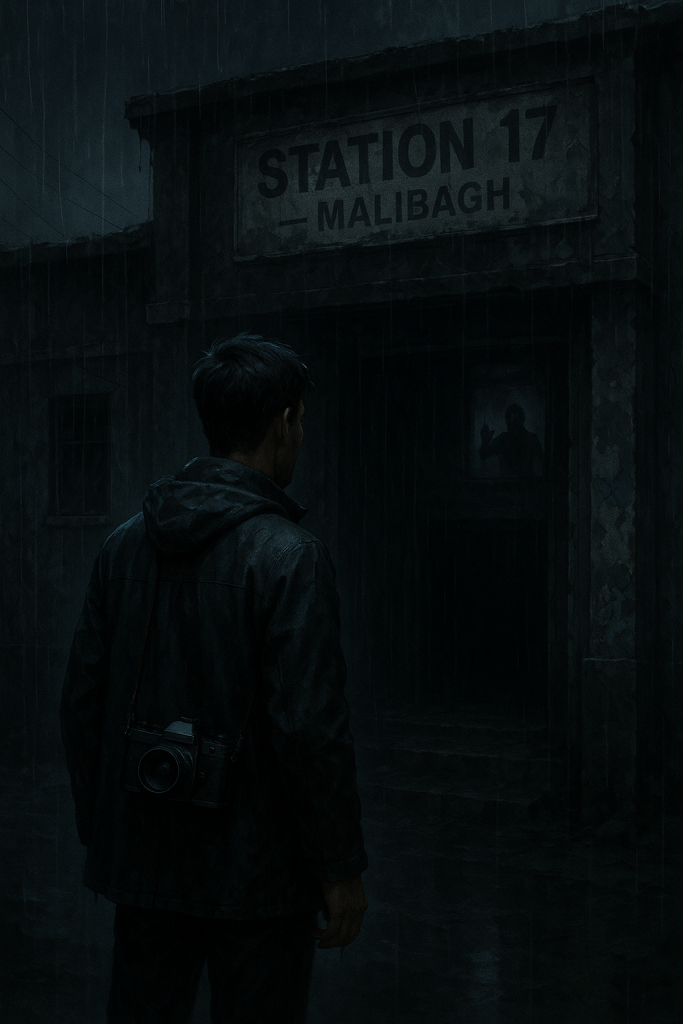
The photo stared back at him.
Aminul turned it over in his hands again and again, desperate for something — a crack, a stamp, a watermark. Anything.
Nothing.
Until he saw it.
In the far background, behind the grinning minister, a peeling poster clung to the wall.
Half-erased by grime and shadows, only three words were still legible:
“Station 17 — Malibagh.”
Station 17. An old power substation on the edge of the city.
Abandoned for years after a fire. Rumors said it was haunted, or worse — claimed by gangs and lost souls.
Aminul’s heart thudded harder.
He slid the photo into his jacket, threw on a battered raincoat, and grabbed the old Nikon camera he hadn’t used in months.
Truth needed proof.
Proof needed eyes.
And right now, his were wide open.
The rain felt colder once he stepped outside.
Dhaka’s night had become a dripping, shivering thing — neon signs bleeding colors down wet alleys, motorbikes hissing past like angry insects.
He flagged a rickshaw and gave the driver the address.
The man frowned.
“You sure, bhai? Nothing there now. Bad people after dark.”
Aminul slipped him an extra bill.
Bad people after dark were the whole reason he was here.
The rickshaw creaked through the labyrinth of streets.
Past the glitter of shopping malls. Past the endless rows of tea stalls.
Past safety.
The further they went, the quieter the city became.
Until it was only the slosh of wheels through puddles and the hollow echo of his own breathing.
Station 17 loomed ahead — a hunched skeleton of concrete and rust, forgotten by the living.
Aminul paid the driver and watched the man speed away without looking back.
He stood there alone, the rain sliding off his coat, his camera hanging heavy around his neck.
The entrance was a yawning black mouth.
No lights.
No sounds, except for the city’s slow drowning.
He took one step toward it.
Then another.
Then —
A flicker of movement in the broken window above.
A figure, just a silhouette against the ruined sky, watching him.
Aminul froze.
The figure raised a hand, slow and deliberate, and pointed directly at him.
Before Aminul could react, the figure vanished into the darkness.
Chapter 3: Under the Skin
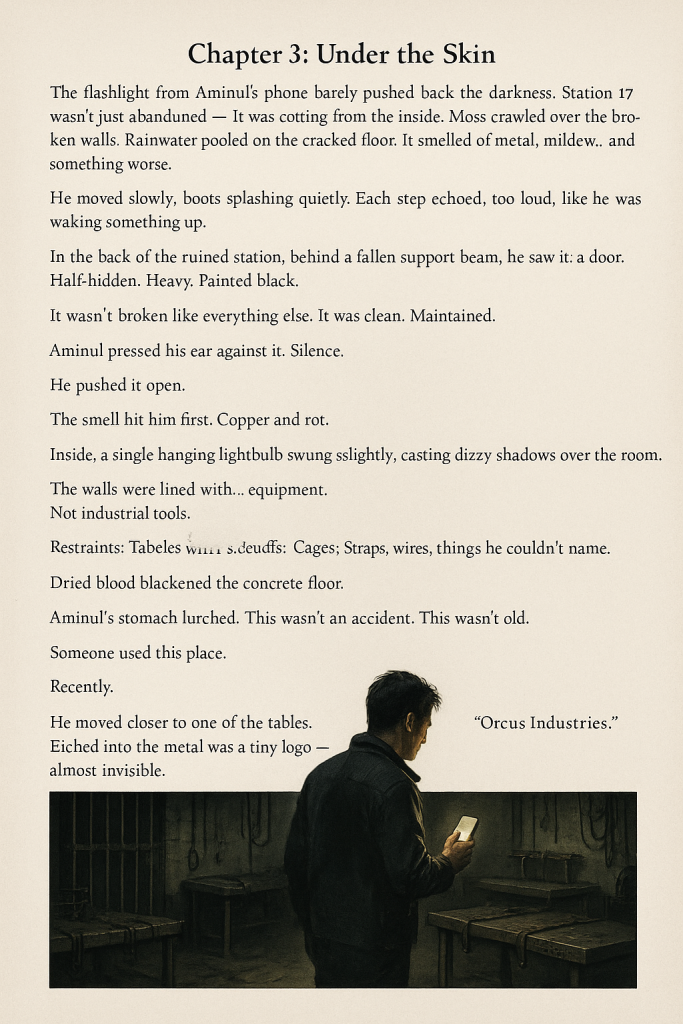
The flashlight from Aminul’s phone barely pushed back the darkness.
Station 17 wasn’t just abandoned — it was rotting from the inside.
Moss crawled over the broken walls. Rainwater pooled on the cracked floor.
It smelled of metal, mildew… and something worse.
He moved slowly, boots splashing quietly.
Each step echoed, too loud, like he was waking something up.
In the back of the ruined station, behind a fallen support beam, he saw it:
a door.
Half-hidden. Heavy. Painted black.
It wasn’t broken like everything else.
It was clean. Maintained.
Aminul pressed his ear against it.
Silence.
He pushed it open.
The smell hit him first.
Copper and rot.
Inside, a single hanging lightbulb swung slightly, casting dizzy shadows over the room.
The walls were lined with… equipment.
Not industrial tools.
Not electrical supplies.
Restraints.
Tables with steel cuffs.
Cages.
Straps, wires, things he couldn’t name.
Dried blood blackened the concrete floor.
Aminul’s stomach lurched.
This wasn’t an accident. This wasn’t old.
Someone used this place.
Recently.
He moved closer to one of the tables.
Etched into the metal was a tiny logo — almost invisible.
“Orcus Industries.”
He frowned.
He had never heard of it.
Right there, in that room stinking of blood and secrets, he pulled out his phone and googled the name.
No results.
No company listings.
No articles.
Not even a single mention on obscure websites.
Nothing.
It didn’t exist.
Or it wasn’t supposed to.
The city felt a million miles away now.
Aminul’s hands shook — from the cold, from adrenaline — as he backed out of the room.
He knew one thing:
If “Orcus Industries” was real, it lived where the normal internet couldn’t find it.
He needed to go deeper.
Into the hidden places.
Into the places people pretended didn’t exist.
Into the Dark Web.
As he slipped away into the night, the broken station behind him, he didn’t notice the shadow leaning against a wall across the street.
Watching.
Smiling.
Waiting for him to take the next step.
Chapter 4: Blood in the Wires
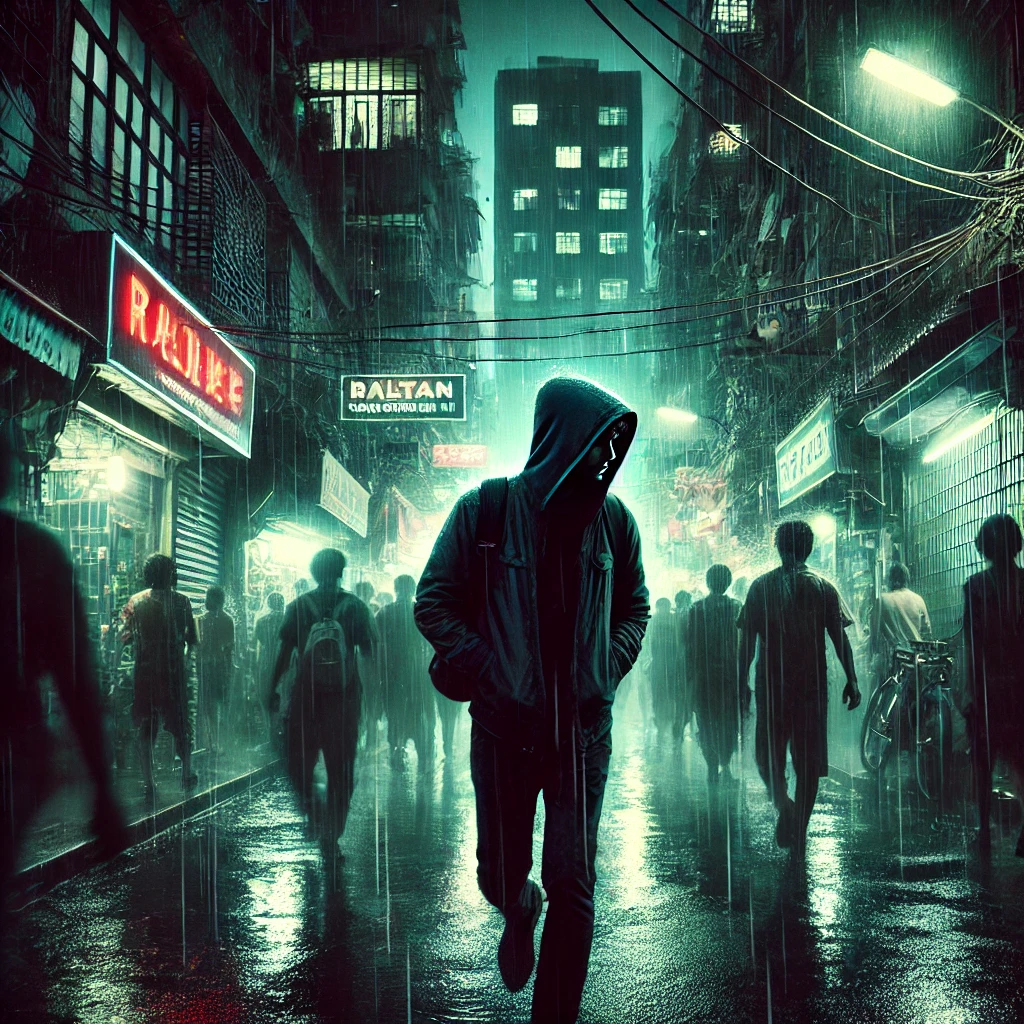
The city blurred by under neon rain.
Aminul kept his head low, weaving through the crowds, moving faster than instinct.
He was going to someone he hadn’t spoken to in years — someone he never thought he’d need again.
Rafiq Hossain.
Once the shy boy with broken glasses in school.
Now, whispered about as “Ghostframe,” one of the best hackers in Dhaka’s underworld.
The kind of friend you only call when the world’s falling apart.
Rafiq’s apartment was hidden on the fifth floor of a crumbling building in old Paltan.
The hallway stank of rotting vegetables and cigarette smoke.
Aminul knocked three times — code from school days — and waited.
The door cracked open an inch.
A bloodshot eye peered out.
“…Aminul?”
Rafiq hadn’t changed much.
Still skinny, still twitchy.
Only now his hands shook not from nerves — but from whatever demons he battled every night.
“You brought heat?” Rafiq whispered.
“No,” Aminul lied.
Rafiq hesitated, then pulled him inside.
The apartment was a jungle of wires, old screens, humming servers.
Dark except for the pale green glow of monitors.
“What the hell are you mixed up in?” Rafiq muttered, sliding behind a fortress of keyboards.
Aminul placed the cracked photo and the memory of Orcus Industries on the table.
“I need to find out what this is.”
Rafiq whistled low.
“No promises. If it’s real deep, even I—”
He stopped himself. Swallowed.
Then he started typing.
It took ten minutes.
Ten minutes of navigating encrypted forums, dead drops, black market networks.
Ten minutes for the world Aminul knew to end.
Videos.
Records.
Transactions where human beings were the commodities.
Private auctions.
Masks.
Rooms like the one he had just found — only these were bigger, filled with spectators.
Orcus Industries wasn’t a company.
It was a network of nightmares, operated behind legitimate businesses, protected by people who smiled on television.
Aminul watched a clip.
Fifteen seconds.
He saw things that would never leave him.
He stumbled back from the screen, bile rising in his throat.
“This— this is—” he gasped.
Rafiq didn’t smile.
“You’re not ready for this, bro.”
The laptop beeped.
Both of them jumped.
Security Breach Detected.
Initiating Device Purge.
“No!” Rafiq lunged for the laptop, hands flying across the keys.
Too late.
With a soft whump, a tiny charge hidden inside the laptop ignited — sending shrapnel of plastic and metal flying.
Rafiq slammed into the wall.
Aminul shielded his face, blood from a shallow cut trailing down his cheek.
Before he could even move —
Crack!
The window exploded inward.
A single, clean bullet.
Rafiq slumped sideways, eyes wide, unmoving.
Dead.
Aminul didn’t think.
He ran.
Out the door, down the stairs three at a time.
Bullets didn’t whistle after him — whoever had fired wasn’t aiming at him.
Not yet.
They wanted him to run.
Wanted to watch.
Wanted to hunt.
By the time Aminul disappeared into the alleys of Dhaka, his heart was a drum against his ribs, his mind a whirlwind of fear and fury.
Rafiq was dead because of him.
He had no evidence.
No allies.
No idea who was coming next.
One thing was clear:
If he wanted to survive — if he wanted to fight — he had to become a ghost.
He vanished into the city’s veins, swallowed by the night.
No more help.
No more trust.
He was alone now.
Chapter 5: The Invitation
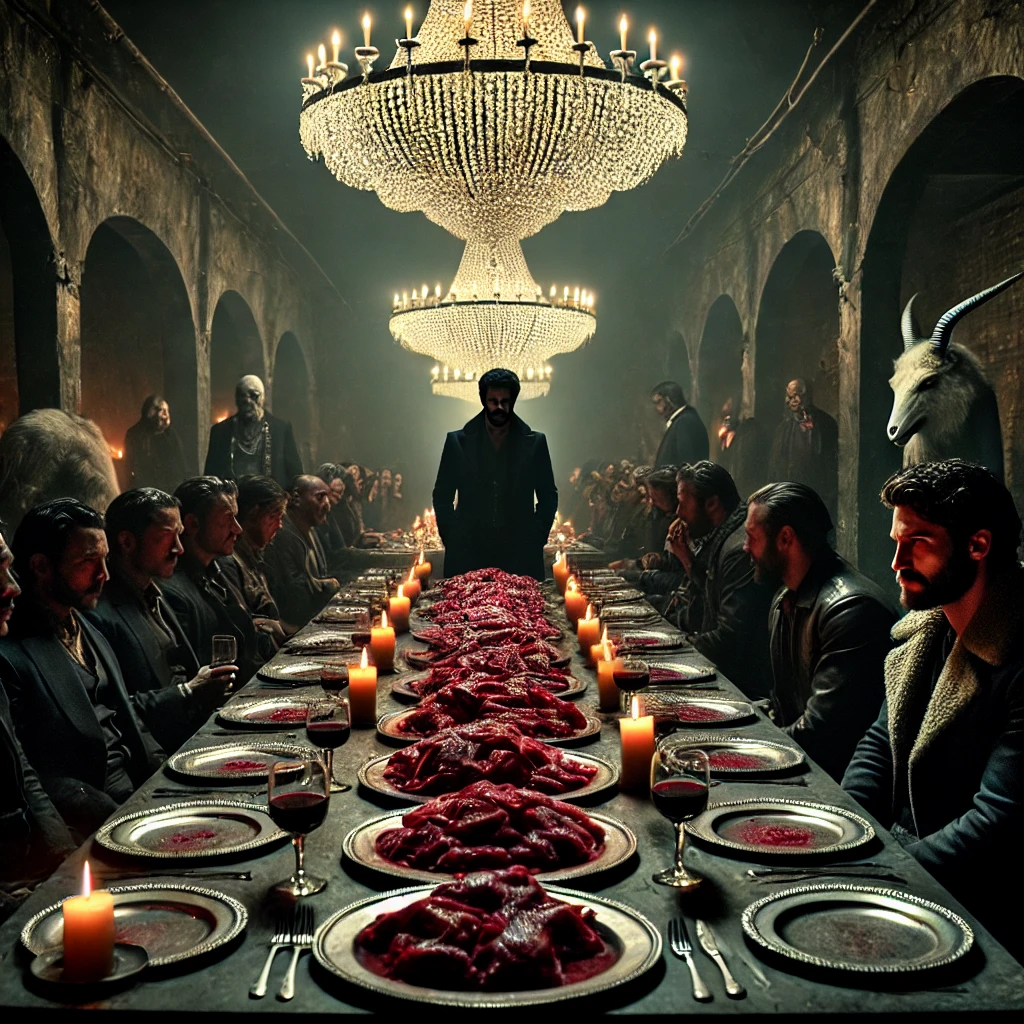
Bandarban was drowning in mist when Aminul reached it.
The hills rolled like the backs of sleeping giants, covered in green wounds of forest and rain.
The old house still stood.
Creaking under the weight of forgotten years.
His grandparents had died seasons ago, and no one had come back.
It was safe.
Dead things were safe.
Aminul collapsed inside, locked the door, and let the storm outside mirror the storm inside him.
That night, Aminul broke.
All the walls he had built — the toughness, the cleverness, the anger — shattered.
He sobbed like a wounded animal.
Cursing himself.
Cursing this city, this country, this world.
He wanted to leave.
He wanted to vanish.
A plane ticket to anywhere — to a world where people didn’t wear human skins as masks.
Maybe London.
Maybe Cairo.
Maybe nowhere.
Maybe he was already dead.
The knock came just before midnight.
Soft. Gentle.
Mocking.
Aminul flinched.
Heart hammering, he opened the door.
No one.
Just the hiss of rain.
At his feet, an envelope.
Cream-colored. Thick.
Inside:
A card.
“You’re invited.
Tonight, 3:00 AM.
Kallol Restaurant, Dhaka.”
Simple. Elegant.
It hit him like a bullet.
They knew.
Knew where he was.
Knew what he was thinking.
There was no escape.
By 1:00 AM, Aminul was already riding the battered highway back toward Dhaka, motorbike roaring under the bruised sky.
No running.
No hiding.
If they wanted him to see something — he would.
But he would remember it.
And one day, he would burn their world down.
Kallol Restaurant sat quietly at the edge of the city, an old riverside place abandoned for years.
No lights.
No cars.
Except…
one door.
Unlocked.
Inside, a narrow stairway down.
At 3:00 AM sharp, the real party began.
The basement was a cathedral of shadows.
Long tables stretched under crystal chandeliers.
Elegant guests — in suits, dresses, masks of wolves and goats and blank porcelain faces — sat sipping dark wine.
At the center of the tables: silver platters.
Covered.
Waiting.
A bell rang.
The platters were uncovered.
Meat.
Red. Raw.
Laid out with ritualistic precision.
Something deep inside Aminul screamed.
The guests smiled behind their masks.
They began to eat.
Not like starving men.
Not like animals.
Like connoisseurs.
Every bite slow.
Savoring.
A man in a dark suit, wearing a simple black mask, approached Aminul.
His voice was calm, soft:
“Freedom, Mr. Chowdhury,
comes from giving up shame.”
He gestured to the empty seat at the table.
“You must choose to eat.
Or choose to die.”
Aminul stood there.
Frozen.
The smell of blood and wine and perfume wrapped around him like a noose.
He knew:
If he ran, he would be hunted, butchered like a dog.
If he stayed, he would drown in this filth.
No good choices.
Only survival.
He clenched his fists.
Swallowed the bile rising in his throat.
And sat down.
[End of Chapter 5]
Chapter 6: The Death of Innocence
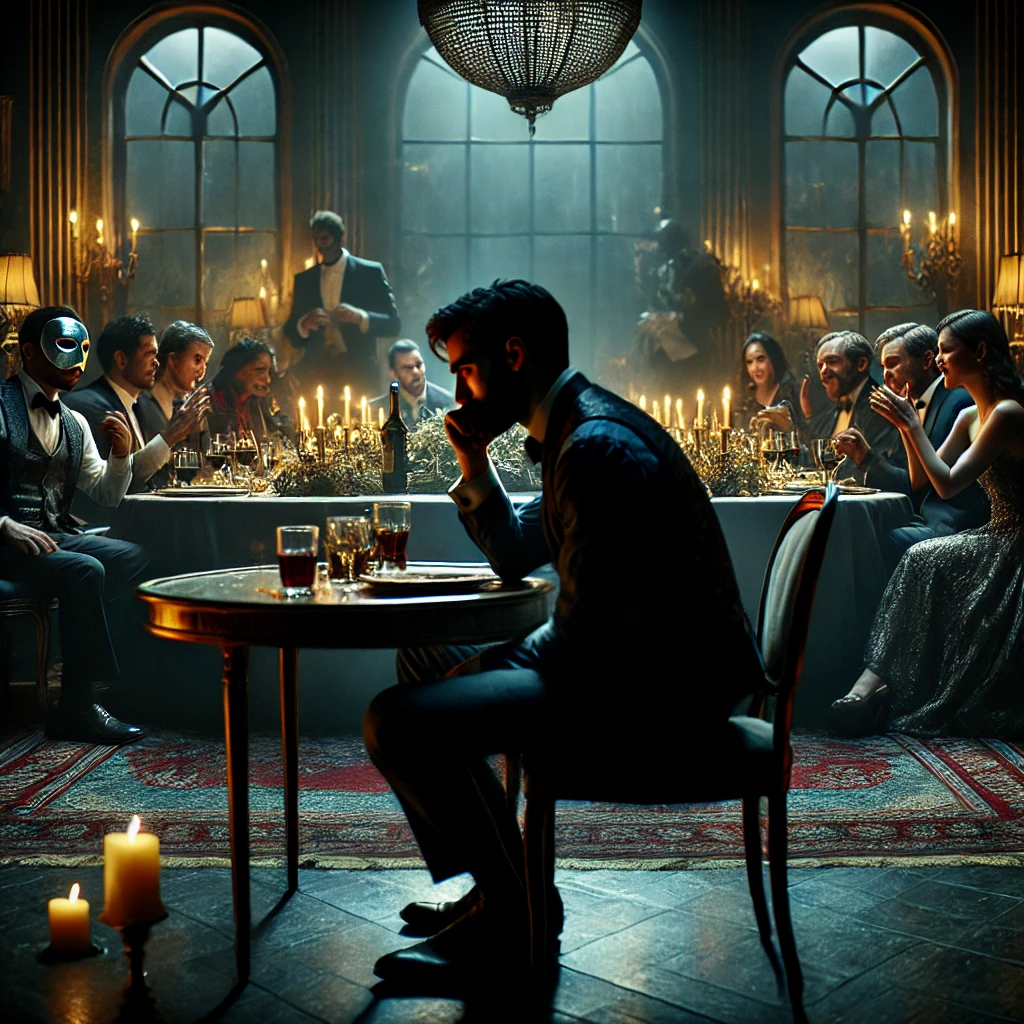
The meat tasted like nothing he knew.
It wasn’t sweet.
It wasn’t salty.
It wasn’t even the horror of it that struck Aminul.
It was the silence inside his own mind.
As he chewed, the orchestra played soft music.
The guests laughed, chattered in elegant tones, sipping wine and discussing business, politics, poetry.
It was just another night.
It was always just another night for them.
Aminul swallowed.
He didn’t scream.
He didn’t cry.
He didn’t vomit.
Somewhere deep inside, he felt a door slam shut.
Lock itself.
A room inside his soul — the part that cared, the part that loved, the part that had believed the world could be good —
was gone.
You wanted to see the truth, a voice whispered inside him.
This is the price.
The hours blurred.
Wine. Laughter.
Masks smiling without smiles underneath.
He watched without blinking.
Faces without humanity.
Hands holding meat like art.
And somehow…
he understood.
They weren’t monsters.
They were what happened when you stripped everything away — law, faith, guilt, shame —
this was what was left.
Raw.
Naked.
True.
The first call to Fajr echoed across the city like a wound.
The guests rose.
Chairs scraped back.
Masks were removed — but only partly, still hiding enough.
They moved toward private elevators, limousines waiting upstairs.
The party was over.
Until the next one.
Aminul walked into the black morning alone.
Past streets still slick with last night’s rain.
Past beggars curled under broken streetlights.
He returned to his old flat in Manikdi, hidden behind cracked brick walls and rusted grills.
A home that no longer fit him.
He sat on the mattress on the floor, the room still smelling faintly of his old life — cheap cigarettes, instant noodles, dusty books.
He stared at the ceiling, and inside his mind, the war began.
The inner dialogue:
You ate flesh tonight.
You let the devil sit at your table.
You smiled at monsters and shook their bloody hands.
He clenched his fists.
But now you know.
Another voice whispered back, colder:
They fear only those who can play their game better than them.
Mercy is weakness.
Fear is death.
Pity is suicide.They don’t care if you’re good.
They only care if you’re strong.
He closed his eyes and let the old Aminul die in the silence.
The one who thought he could expose them with a newspaper article.
The one who thought truth alone could beat them.
That boy was gone.
What remained was something harder.
Sharper.
Unbreakable.
He whispered to the darkness:
“You wanted me to see?
Fine.
Now watch what happens when a dead man comes for you.”
[End of Chapter 6]
Chapter 7: The Calm Before the Fire
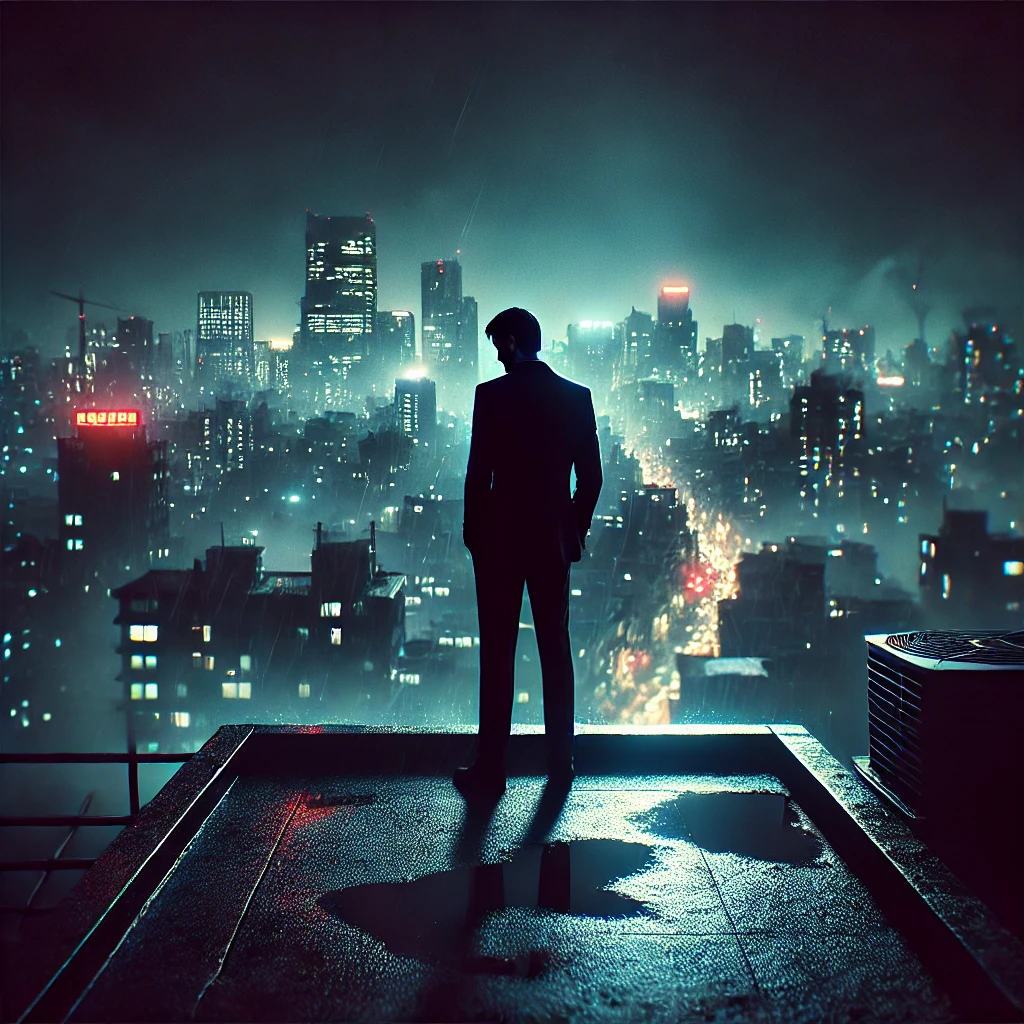
The city pulsed around him, but Aminul moved through it like a ghost.
No more hiding.
No more running.
He wasn’t prey anymore.
He was a knife sharpening itself in the dark.
They believed he was one of them now.
They believed he had surrendered.
Good.
That belief was his weapon.
The first thing he needed was silence inside his own mind.
No anger.
No guilt.
No hope.
He spent hours every day in the cracked flat in Manikdi, sitting still, staring at the blank walls, learning to kill every unnecessary thought.
Feel nothing. Think everything.
Emotion was a luxury he could no longer afford.
Next came the hunt for knowledge.
He spent nights in internet cafés, libraries, abandoned rooftops with a laptop balanced on his knees.
He mapped out what he could find of Orcus Industries:
Names whispered in dark forums.
Shadow companies with links to private militaries.
Missing person reports buried under paperwork.
Every thread he pulled showed him how deep the roots went.
He wasn’t just fighting men.
He was fighting an empire built on the decay of civilization itself.
He trained in secret.
Not with loud gunshots or flashy martial arts.
He learned the art of disappearing:
How to pick locks quietly.
How to change appearance in thirty seconds.
How to melt into crowds.
How to kill — if necessary — without making a sound.
Aminul knew brute strength wouldn’t save him.
Only precision.
Only silence.
He built a mask for himself.
A new identity inside Orcus’s world.
The man they thought they owned:
Quiet.
Efficient.
A loyal servant.
He set up a fake consultancy firm as a front.
He opened anonymous bank accounts.
He wore suits now — nothing flashy, just enough to blend in among the corrupt executives and smiling monsters.
The boy who once scribbled truth in dusty notebooks was dead.
But he needed more.
He needed to know how deep their sickness ran.
So he ran small tests.
He leaked a tiny rumor into the lower circles — a false hint of police interest in one of Orcus’s illegal fronts.
He watched.
They didn’t panic.
They erased the evidence overnight.
He smiled grimly.
Efficient. Ruthless. Predictable.
Their predictability was his future weapon.
Days blurred into weeks.
No contact with old friends.
No family ties.
No phone calls.
No online presence.
Aminul Chowdhury became a ghost who wore a human face.
The silence inside him was no longer a struggle.
It was a shield.
On a rain-slick rooftop one night, he stared down at the blurred neon lights of Dhaka.
The city rotted under the weight of its own secrets.
He whispered into the wind:
I sold my soul for this…
Now I will spend it burning you all to the ground.
And somewhere deep inside —
the part of him that still remembered fear
the part that still remembered faith
—the part that once dreamed of saving the world—
whispered a final prayer.
Then it, too, went silent.
[End of Chapter 7]
Chapter 8: The Skin Game
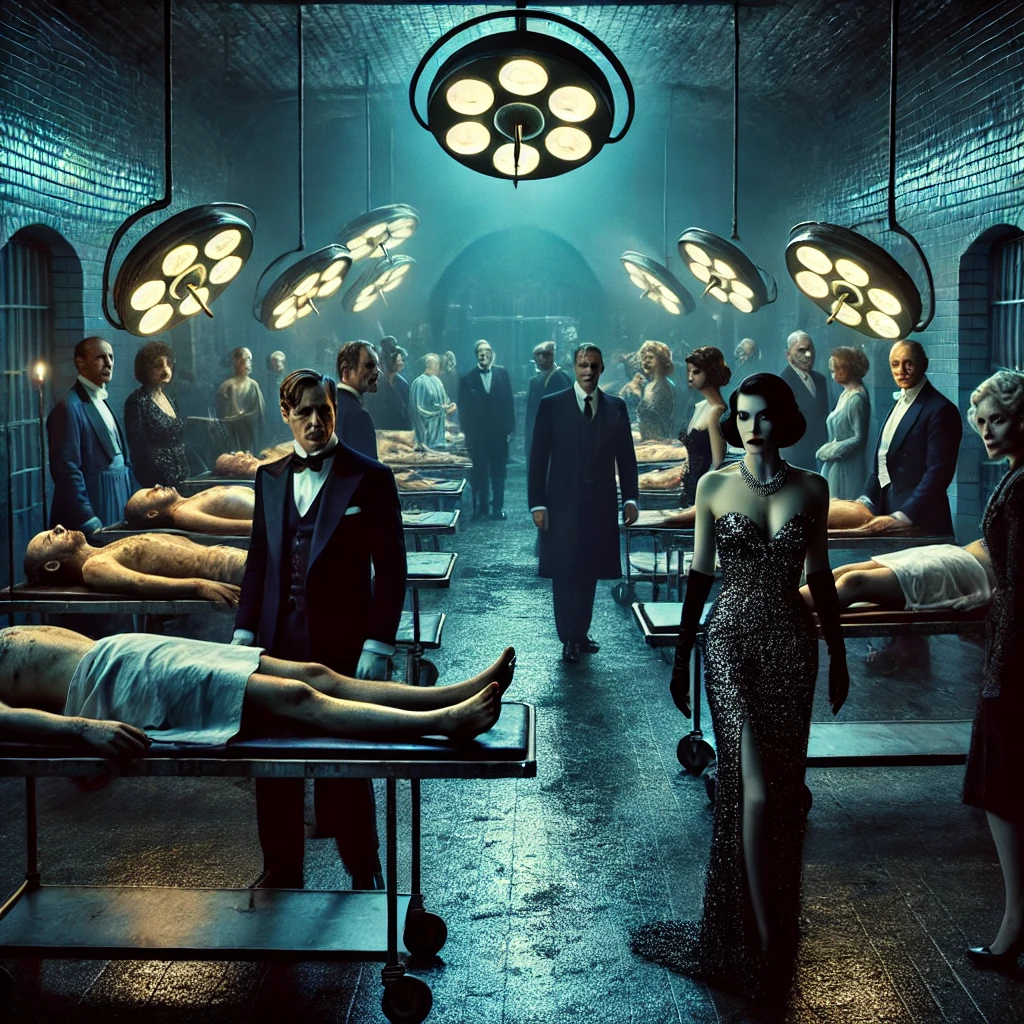
The invitation came in a small black envelope, slipped under his door without a sound.
A silver insignia stamped on the wax seal —
a scalpel piercing a heart.
No words.
Just a time.
Just a place.
And Aminul knew.
This was the next gate he had to walk through.
The party was hidden beneath a seemingly abandoned hospital near the city’s edge.
Inside, the world was drenched in soft blue lights and antiseptic smells.
Men and women in fine suits and glittering dresses walked casually between operating tables, where living human beings were strapped down like offerings.
The rules were simple:
Play surgeon.
Cut, slice, experiment.
If the “patient” survived without screaming, he earned money.
If he died — his family, somewhere far away, received a fortune they would never question.
A grotesque lottery of pain and greed.
Aminul moved carefully, observing, playing the part.
He didn’t lift a scalpel.
Not yet.
He only watched — his sharp eyes recording everything.
Faces. Procedures. Conversations whispered over open wounds.
And that’s when he saw her.
She didn’t belong — at least not like the others.
Where the other guests leered and laughed, she moved with an eerie grace, almost… respectfully.
She wasn’t there for sadism.
She was there for curiosity.
Her eyes — sharp, amused, fascinated — met his across the room.
A silent invitation passed between them.
Later, they sat at a dusty old café tucked in an alley near Shantinagar, sipping bitter coffee under a flickering fan.
Her name, or at least the one she gave, was Nadia Karim.
She was sharp, witty, with a voice that was almost too calm for the things she described.
“Why are you here?” she asked Aminul, tapping her cup lazily.
“Curiosity… or hunger?”
Aminul smiled thinly.
“Same reason you are. To understand.”
She laughed — a soft, musical sound that didn’t quite reach her eyes.
“I used to believe in rules once,” Nadia said, tracing the rim of her cup.
“Family. Career. Morality. But rules are just a soft blanket people cling to. Strip them away, and you find what’s real.”
She told him about her beginning —
How a lost bet, a moment of desperation, had dragged her into this world.
How, at first, she had cried after every party.
How the guilt gnawed at her.
How, eventually, the guilt turned to curiosity…
and curiosity became pleasure.
“Pain,” she said, “is the purest form of honesty. Everything else is just a game.”
Aminul listened, fascinated and disturbed.
Was she broken?
Or had she simply understood something he hadn’t yet?
Inside his mind, two wolves fought —
The Aminul who still clung to right and wrong,
and the Aminul who had already tasted the darkness and felt its bitter freedom.
Before they parted, Nadia leaned in close.
Her perfume was sharp, metallic — like blood and roses.
“You’re not like the others,” she whispered.
“You’re still asking questions.
That makes you dangerous.
But it also makes you interesting.”
She slipped him a card.
No name.
No number.
Just an address.
“Come find me when you’re ready to stop pretending.”
Then she disappeared into the rain, leaving Aminul alone with his thoughts…
and the growing, terrifying realization that he was starting to enjoy the questions more than the answers.
[End of Chapter 8]
Chapter 9: The Mask Falls

The address Nadia gave him led to a crumbling apartment block hidden between the neon chaos of Tejgaon.
She met him at the door, dressed casually in jeans and a leather jacket, her hair tied back.
Tonight, there was no flirtation in her eyes.
Only cold purpose.
“You want to understand?”
“Come. Watch.”
They climbed five flights of narrow, broken stairs and stepped into a tiny, bare room filled with old surveillance monitors.
Each screen flickered with black-and-white images:
A man in a designer suit pacing nervously.
A middle-aged woman whispering frantically into a phone.
A teenage boy laughing as he scrawled something on a wall with a knife.
Aminul frowned.
“Who are these people?” he asked.
Nadia lit a cigarette and pointed at the first screen.
“Him? CEO of a charity. Loves talking about justice. But when we gave him freedom — no law, no cameras, no rules — he strangled a homeless man just to see if it felt powerful.”
She pointed to the woman.
“Schoolteacher. Mother of three. But the moment she thought no one was watching, she sold a child for money she didn’t even need.”
The boy.
“Rich politician’s son. We simply told him there were no consequences. He started his own little… hunting club.”
Aminul stared at the screens, his stomach twisting.
They hadn’t forced these people.
They had simply… unleashed them.
Nadia turned to him, her face illuminated by the cold light.
“Orcus doesn’t create monsters, Aminul,” she said softly.
“It reveals them.”
She changed the channels.
Hundreds of screens now.
Hundreds of faces.
Ordinary people — bankers, teachers, artists — all given freedom from consequences.
All descending into cruelty, greed, perversion.
Aminul leaned against the wall, the weight of it crushing him.
He thought he was fighting some shadowy organization.
But the real enemy?
It was buried inside everyone.
Waiting.
Nadia came closer, her voice almost a whisper.
“This city… this world… it’s already rotting.
They don’t deserve saving.
They deserve judgment.”
She placed a small black folder into his hands.
Inside —
photographs, names, addresses.
Targets.
“You want to see the truth?” she said.
“You want to burn Orcus to the ground?
Start here.
Help us punish the monsters.”
Aminul stared at the folder.
It was so easy, wasn’t it?
Label someone a monster.
Make them pay.
Lose himself in the crusade.
The part of him that still believed in redemption screamed silently inside his mind.
But the colder, harder part —
the new Aminul —
felt the temptation sink into his bones.
Maybe Nadia was right.
Maybe the only way to fight monsters…
was to become something worse.
Outside, the call to prayer floated through the city, soft and distant.
A reminder of something older than law, older than chaos.
For a moment, Aminul closed his eyes.
Then he opened them again, hard and sharp.
The war had changed.
And so had he.
[End of Chapter 9]
Chapter 10: Judgment Day
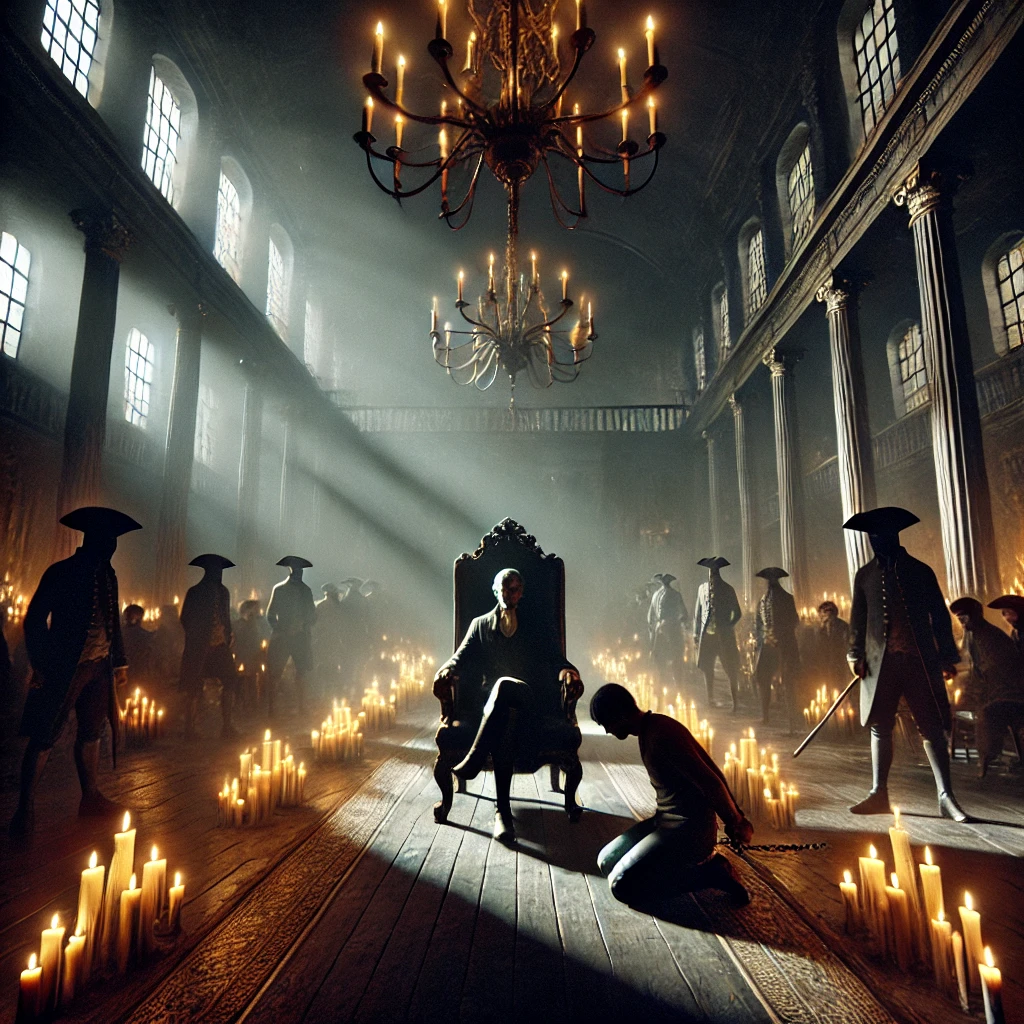
The streets of Dhaka blurred into a fog of blood and neon lights.
Night after night, Aminul carried out the missions Orcus gave him.
At first, it felt like justice.
Later, it just felt necessary.
He judged them:
A corrupt politician found hanging from his office window.
A doctor exposed and left to be torn apart by the families of the children he had betrayed.
A man who trafficked hope turned into meat for the games.
Each life extinguished added a new scar to Aminul’s soul.
But he told himself it was right.
He had to believe it was right.
Or what had he become?
Then came the black envelope.
This one without a name, only an address —
an abandoned colonial mansion at the edge of the city.
And the gun they gave him this time?
Empty.
He should have known.
Inside the crumbling mansion, masked men dragged him down marble hallways and threw him into a great dark hall, lit only by a thousand candles.
At the far end of the hall sat a figure in a throne-like chair —
not grotesque or monstrous,
but calm, elegant, almost… sorrowful.
A voice, deep and resonant, echoed through the hall:
“Aminul Chowdhury.”
“The hunter becomes the hunted. The judge becomes the judged.”
The figure rose, stepping into the light.
A face both familiar and strange —
handsome, old, with sharp eyes that burned like coals.
The man spoke again, softly, almost kindly:
“You came to uncover Orcus.”
“You came seeking the truth.”
He walked closer.
“But in your anger… you became one of us.”
“You thought yourself righteous — punishing those you judged evil.”
He circled Aminul slowly, like a teacher walking around a guilty student.
“But did you ever stop to think?”
“Some of those you killed could have been forgiven.”
“Some of those you destroyed might have found redemption if you had shown them another way.”
He paused, looking straight into Aminul’s soul.
“You made the same mistake we did.”
“You gave no mercy. Only judgment.”
The masked men closed in.
Chains clinked.
Aminul struggled, but he was weak now —
broken, hollowed by the things he had done.
The figure leaned close and whispered:
“Now, Aminul Chowdhury…”
“You will be punished.”
“As we punish all those who forget that monsters can still bleed. And still cry. And still change.”
The chains bit into his wrists.
The candles flickered violently, as if the air itself recoiled from what was to come.
Aminul closed his eyes,
not in fear —
but in bitter understanding.
He had walked into the darkness…
and forgot to carry any light.
Now he would pay the price.
[End of Chapter 10]
Chapter 11: The Fall of Aminul
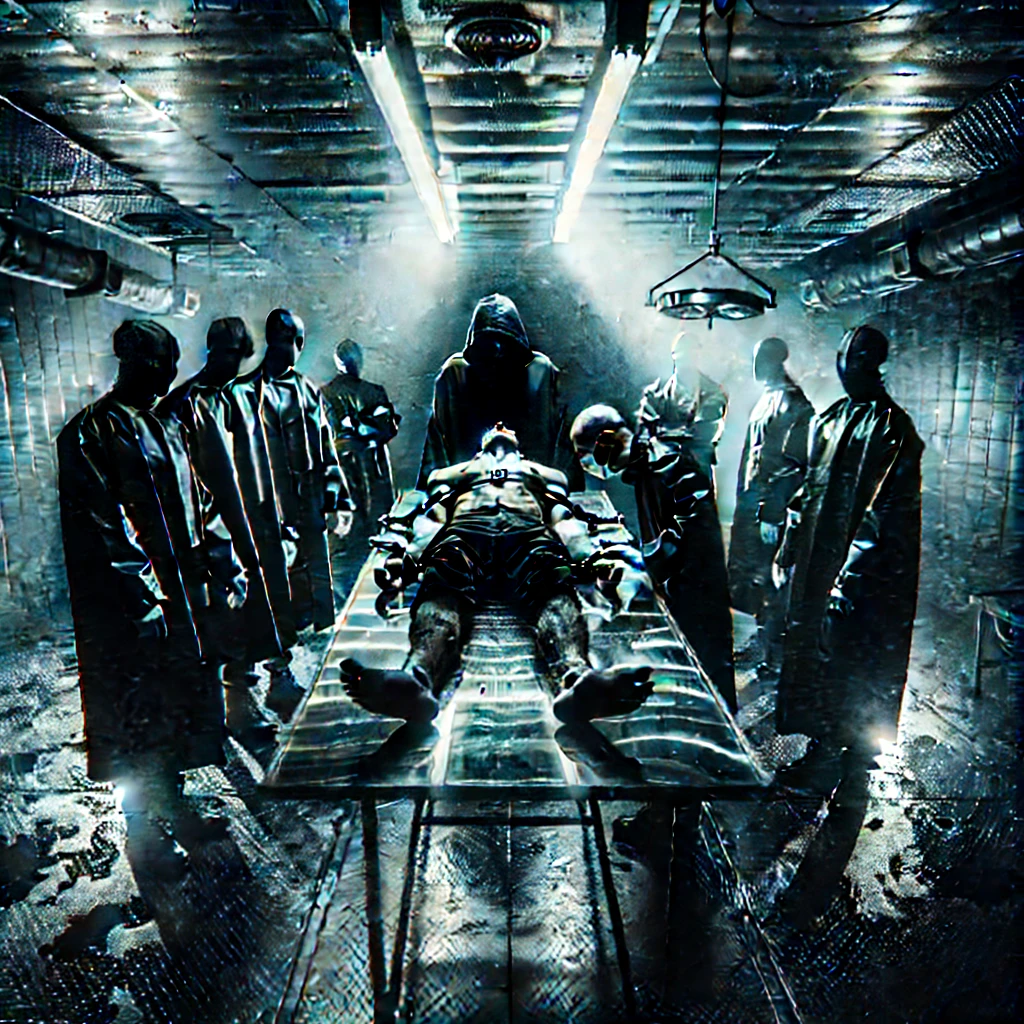
The black hood was ripped from Aminul’s head.
The first thing he saw was light—cold, harsh, buzzing fluorescent light drilling into his skull.
The air was thick, metallic. His arms and legs were strapped tightly to a steel table. He tried to scream, but a dry rasp came out instead.
Footsteps clicked on the tiled floor.
Figures in black coats circled him, faceless, silent.
One of them leaned down, whispering into his ear:
“Welcome home, Aminul. You wanted to uncover the truth… now you’ll live in it.”
The first bolt of electricity hit him — short, sharp, ripping through every nerve.
He convulsed against the straps, the smell of burning flesh filling the room.
They didn’t ask questions.
They didn’t demand confessions.
They simply began.
Days blurred together.
When the beatings stopped, the branding started.
A red-hot iron pressed against his chest — a twisted symbol etched into his skin.
“This one,” a voice said casually, “for the man you judged at the factory.”
Another searing pain across his forearm.
“This one, for the woman you decided was beyond redemption.”
The list went on.
Each scar was a memory.
Each wound, a reminder.
When they tired of tearing his body, they turned to his mind.
Locked in a windowless padded cell, Aminul was left with only his own breathing —
and the voices.
At first, they were whispers behind the walls.
Then they became louder, closer.
He heard his hacker friend’s dying scream, again and again.
He heard Nadia’s voice, weeping in disappointment.
He heard his grandparents, whispering prayers that twisted into curses.
Sometimes, he saw them — standing in the corners of the room, accusing, bleeding, rotting.
“You failed us.”
“You judged when you should have forgiven.”
“You are one of them now.”
There was no day, no night.
Only the endless, suffocating now.
They fed him slop through a hatch in the door.
Sometimes they forgot for days.
Sometimes they flooded the cell with hallucinations — vivid and cruel —
until Aminul clawed at the walls until his fingers bled, screaming for it to stop.
One day, after what could’ve been weeks or months, the door creaked open.
A man in a white lab coat entered.
His face was hidden behind a porcelain mask — a smiling one.
He placed something on the floor in front of Aminul.
A revolver.
“You can end your suffering, Aminul.”
“Freedom is just a choice.”
Aminul crawled toward it, trembling, broken.
Tears blurred his vision as he wrapped his bloody fingers around the gun.
He pressed the cold metal to his temple.
Click.
Empty.
The masked man laughed, softly at first, then the whole hallway erupted in mocking, inhuman laughter.
The gun was ripped from his hands.
The door slammed shut again.
And the whispers returned — louder, crueler.
Aminul curled into a ball on the filthy mattress.
His body was a map of scars.
His mind a shredded ruin.
He whispered to himself, again and again:
“Please… let me die… please…”
But Orcus was merciful in only one way:
They made sure he lived.
Because death was too kind.
Chapter 12: The Spark That Refused to Die
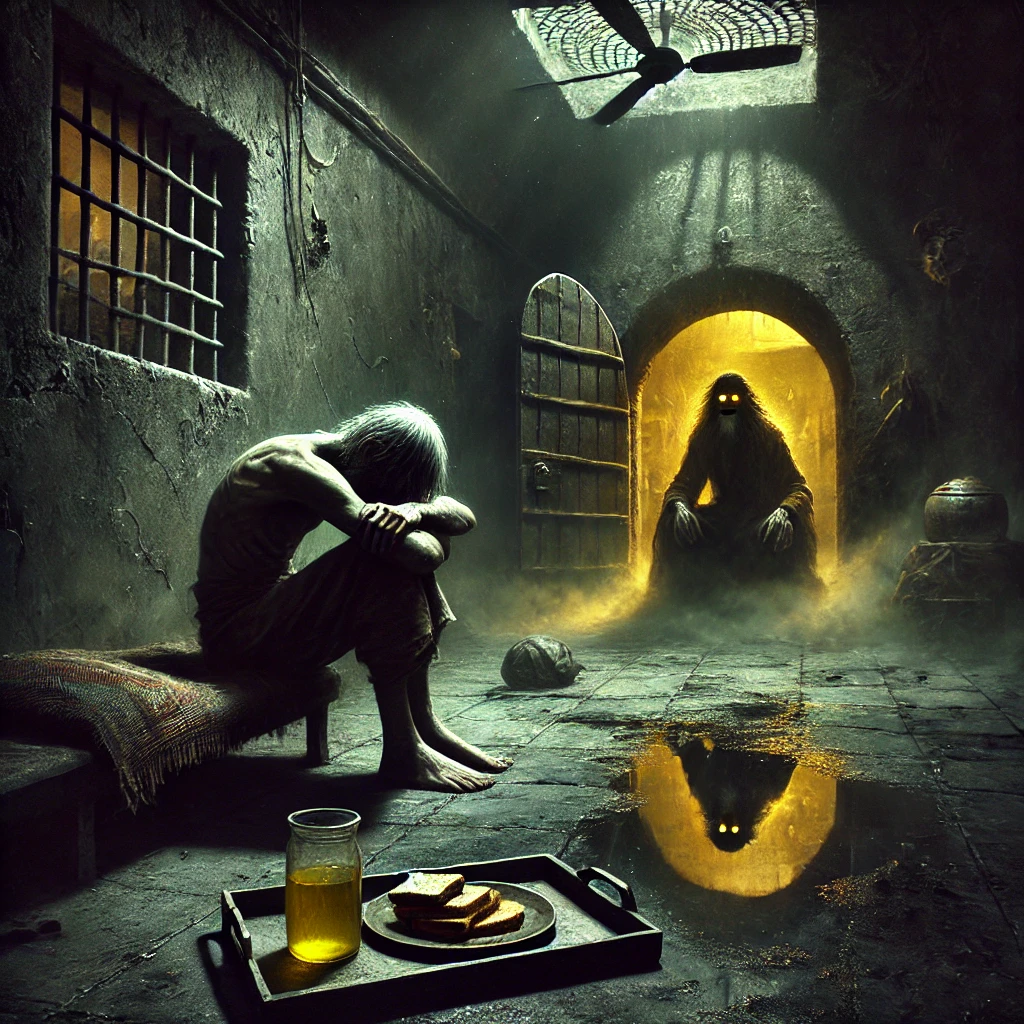
The walls whispered.
Aminul sat on the cracked floor of his cell, arms wrapped around his knees, head bowed. His body trembled—not from fear anymore, but from the withdrawal of whatever drugs they kept pumping into his veins.
Above him, a single broken fan spun lazily, slicing the thick air into uneven sighs.
Days had no meaning here. Nights bled into mornings without mercy.
Sometimes, they fed him. Sometimes, they forgot.
And still… he lived.
He should have given up.
He should have let the darkness swallow him.
But inside the cracks of his broken mind, a spark burned.
Small. Insignificant.
Alive.
The door screeched open.
A guard threw a tray into the room. Stale bread. Yellow water.
Aminul didn’t look up. He waited. Counted the guard’s steps. Listened to the metallic click of the door locking again.
Then silence.
Slowly, he raised his head.
His reflection stared back from the water in the metal plate — a ghost with hollow eyes and bleeding lips.
But the eyes…
The eyes still had fire.
Later that night, through the tiny slit in his door, a whisper slipped in.
“They think you’re blind. Are you?”
Aminul blinked.
He turned his head toward the voice.
Across the hallway, behind another iron door, an old man crouched in the shadows. His hair was long and wild, beard like tangled roots. His eyes gleamed like knives.
“They broke you yet, little lion?”
The voice scratched the air, filled with a broken sort of laughter.
Aminul tried to speak. His throat was raw.
Only a croak came out.
The old man chuckled.
“Good. Keep it that way. Don’t talk too much. They listen through the rats.”
Aminul closed his eyes, trying to focus.
The old man went on:
“They feed on the blind. But the blind can burn the world if they open their eyes.”
“Remember your name. That’s how you kill them.”
And then he was gone — melted back into the dark.
That night, Aminul dreamed.
He saw Imran — his childhood hacker friend — laughing over coffee, moments before the sniper’s bullet tore through him.
He saw the boy in the warehouse, chained and sobbing, before the games began.
He saw Nadia, her face cold and beautiful, whispering about freedom, about monsters.
The images ripped him open.
But from the bleeding… came rage.
And from rage… came purpose.
When morning came, Aminul stood.
Slowly, painfully, he stretched his battered body.
Every movement a rebellion. Every breath a slap in Orcus’ face.
He began to plan.
He began to prepare.
They wanted to kill his soul.
They failed.
(End of Chapter 12)
Chapter 13: The Final Witness
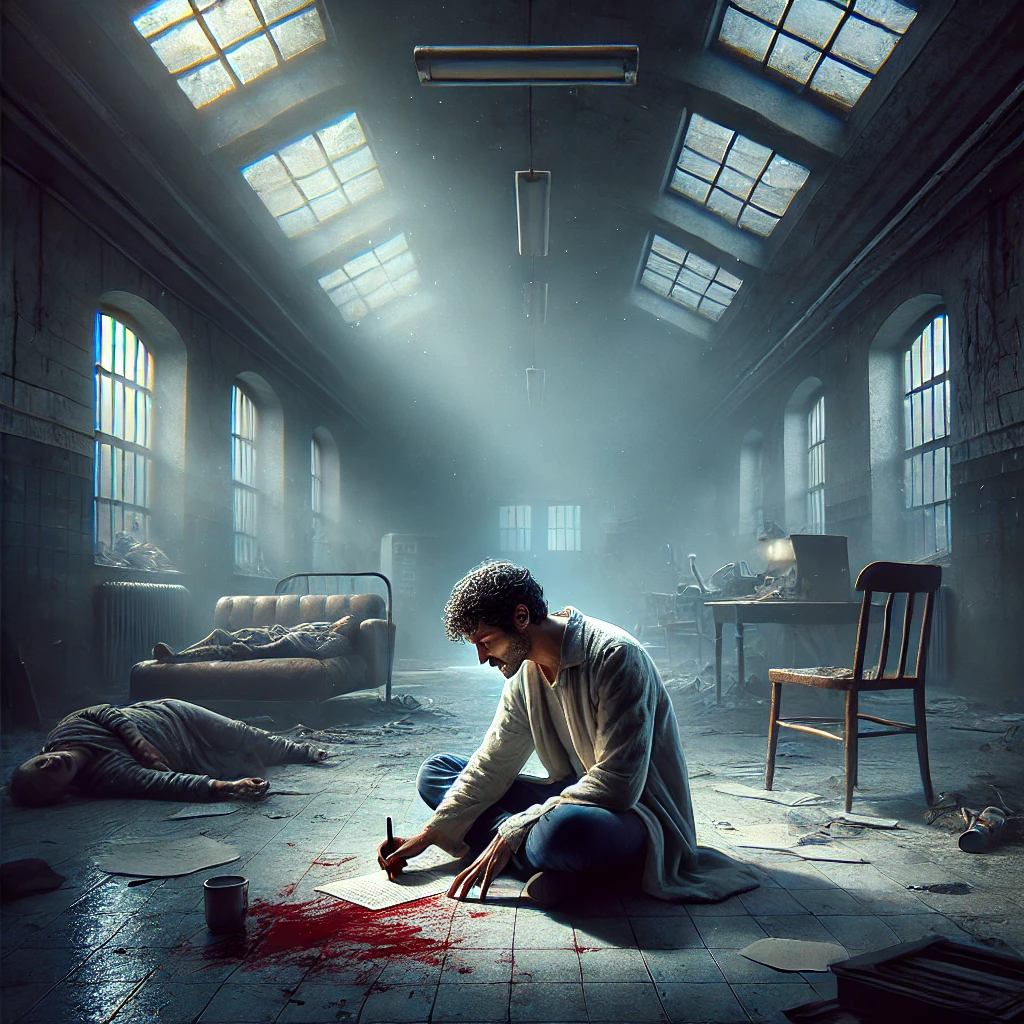
The world outside was a blur.
In the cold silence of the asylum, everything seemed so far away. Time had stopped existing — like a ticking clock that had long lost its rhythm. Every day was an eternity, every night a nightmare.
But in this room, amidst the chaos of his mind, Aminul found clarity.
He was broken, yes.
But not defeated.
Aminul closed his eyes, listening to the silence, the echoes of his past.
The blood. The screams. The darkness.
And yet, in that void, there was something that remained untouched — something that the monsters, the villains, and the pain could never take from him.
Truth.
He had seen the underworld — the darkness that consumed everyone who stepped too close.
He had become one of them. He had witnessed horrors beyond imagination.
And yet, he had also witnessed something else:
The human soul, fragile but unyielding.
He wasn’t a hero.
He wasn’t a villain.
He was simply the last witness — to both the light and the darkness.
A tear slipped from Aminul’s eye, not of regret, but of understanding.
He didn’t need to be saved.
He didn’t need redemption.
He had seen what was real. What was raw. And it would live in him forever.
That was his punishment, but also his salvation.
Aminul stood up, his legs shaking but holding him.
For the first time in years, he smiled — not because he was happy, but because he had finally accepted it all. The guilt. The truth. The pain.
It didn’t matter anymore.
He had no more fight left in him.
No more resistance.
He had become part of the story — the story of everything and everyone who had been swallowed by this world.
And so, Aminul sat down again. His hand trembled as he took the blood-soaked pen, writing the last words he would ever speak:
“I am the witness. I was, and I will always be.”
As he finished the final stroke, the world around him seemed to disappear.
The darkness was no longer his enemy.
It had become his truth.
And in that truth, Aminul was finally free.
[Fade to black]
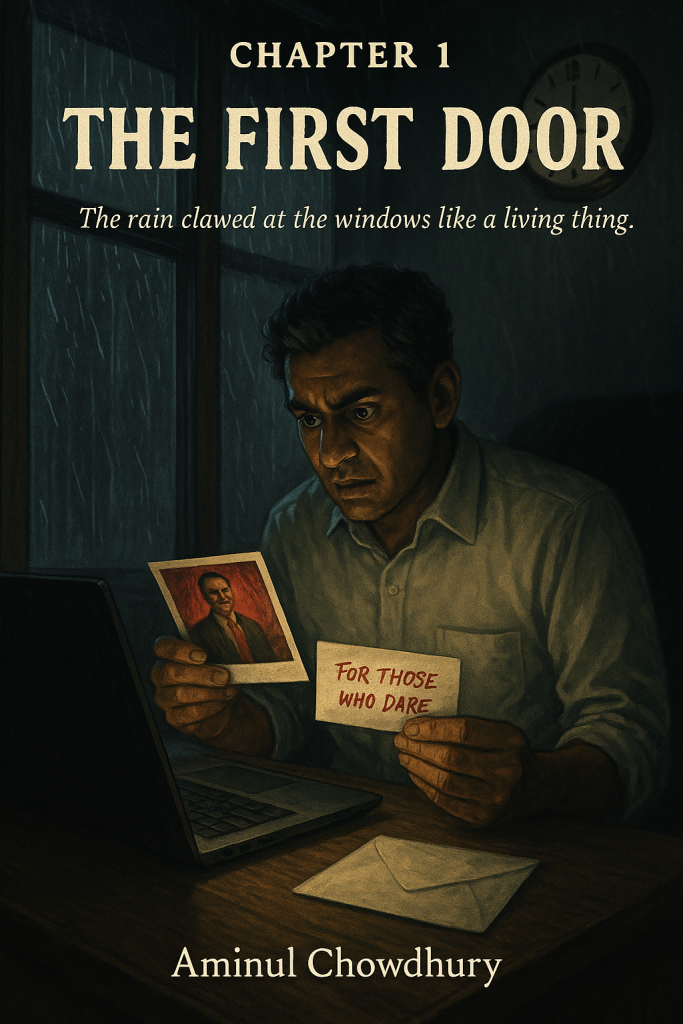
Leave a Reply